GREELEY — The fate of a 50-year-old man accused of killing two Greeley residents in what prosecutors call a love-triangle, is now in the hands of the jury.
The 9 women and 7 men selected to serve on the jury were narrowed to 12 on Tuesday following the conclusion of closing arguments by both sides. The four jurors who were identified as alternates were done so randomly weeks before the trial began by both sides selecting two numbers that would coincide with their juror number.
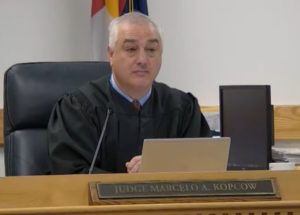
“This is not a reflection of your service,” Weld District Court Judge Marcelo Kopcow said.
The jury was scheduled to begin deliberations at 9 a.m. Wednesday morning after more than two weeks of testimony by dozens of witnesses, hundreds of pieces of evidence and hours of interrogation videos.
Kevin Dean Eastman is accused of killing Stanley Scott Sessions and Heather Frank, 53 and 48 respectively at the time of their deaths. Prosecutors say it was in the name of jealousy and control.
Eastman was originally arrested by Larimer County Sheriff deputies in February of 2020 in connection with the killing of Sessions, who was found dead near Old Flowers and Pingree Park roads in Bellvue, northwest of Fort Collins on Feb. 10, 2020. Sessions had not been heard from since Feb. 8, 2020 when he told his father he was going to Fort Collins to see a friend.
Nearly a week after Sessions’ body was discovered, Frank was found dead at a home east of Greeley, just off U.S. 34 in Kersey on Feb. 16. It is believed that Sessions’ death occurred Feb. 8, 2020 at the home of Frank.
Eastman was arrested in Kersey at a gas station filling a gas container on Feb. 16th. Frank’s body was found in a wood pile nearby a smoldering burn pit at the Kersey location.
Defense offers an alternative theory
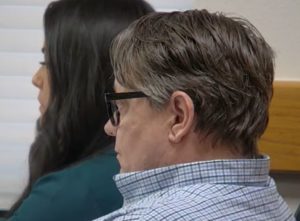
The second week of the trial included Eastman’s attorneys attempting to impeach several prosecution witnesses, to advance their own theory that Frank killed Sessions and that the man who owned the property where her body was found, Troy Bonnell, killed Frank.
Lead defense attorney Samantha Deveraux questioned Eastman’s sister Shelly Brinklow, who Eastman said he was living with in Parachute up until the night before Sessions was last seen. Brinklow testified that her brother was not a jealous man and had no motive to kill either Sessions or Frank. She testified that he had been living with her trying to get sober and move on with his life after he and Frank broke up for a final time in December of 2019.
Brinklow, who prosecutors attempted to impeach because of her own past criminal record, admitted on cross examination that she disliked Frank, and said her brother left her home in the early morning hours of Feb. 8 after she changed the locks on him because he went out the night before drinking.
Prosecutor Steve Wrenn also noted that Brinklow impeded the investigation by refusing to talk to police during the investigation, telling them she was helping the defense and had nothing to say.
The defense also called Bonnell’s ex-wife, Cynthia Bonnell, who was with Troy on the night of Feb. 14, just two days before Frank’s body was found on his property.
Cynthia testified that Troy got a text message while the couple was at dinner at Texas Roadhouse that sent him “over the top,” and she was forced to leave the restaurant just moments after their meal arrived.
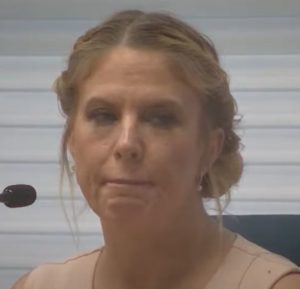
Cynthia also testified that Troy had several cell phones, in support of an argument the defense has made that police investigators never looked into where Troy was the night of Sessions’ disappearance, the day his body was dumped along the Poudre Canyon or after Frank and Eastman arrived at his property the night before Frank’s body was discovered.
At times, Cynthia appeared to be confused about her answers, and on cross examination, Wrenn attempted to impeach Cynthia’s testimony by documenting that her marriage to Troy ended after years of infidelity, leading her to possibly not be fully forthcoming in her testimony about her ex-husband.
Defense attorney’s during closing arguments Tuesday told the jury that the prosecution charged their client based entirely on a “hunch” and blamed poor police investigation for not targeting the right perpetrators.
“Assumption is the mother of all mistakes,” said defense attorney Ashley Morriss. “But why is making assumptions such a dangerous business? When you make assumptions from the outset, what you ignore is deliberate. You ignore things that don’t fit or are inconsistent with your initial assumption.”
Morriss’s point was the defense believes Frank killed Sessions and Troy Bonnell killed Frank. They pointed to what they see are inconsistencies in how evidence was gathered and handled, inconsistencies in testimony by prosecution witnesses, and possible evidence that was never investigated.
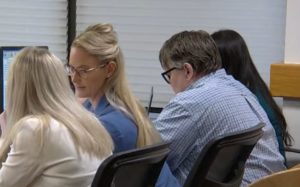
The defense painted Eastman as a broken man, with no job, no money, and no hope. They claimed throughout the trial that Eastman suffered from dissociative disorders, but two attempts to have him deemed unfit to stand trial were both denied.
They told the jury that although Eastman had asked Frank to marry him on multiple occasions — including two days before her body was found on Bonnell’s property — and was denied, her rejection didn’t bother him, saying he was not a jealous man, despite numerous witnesses who testified to Eastman’s violent tendencies and control over Frank during their 7-year, on again-off again relationship.
The prosecution’s case
In his final arguments, Wrenn reminded the jury what “reasonable doubt is not.”
“Reasonable doubt means a doubt that is based on reason and common sense, which arises from a fair and rational consideration of the evidence,” Wrenn said. “… It is a doubt which is not vague, speculative, or imaginary.
“I submit to you, that you just heard two hours of an imaginary theory, unsupported by the evidence that has no basis in reason and common sense.”
Wrenn went on to reinforce the prosecution’s theory of what happened between the dates of Feb. 8, 2020 and Feb. 16, 2020.
“The evidence is: He arrived, he stayed, and he remained during the time that Mr. Sessions arrived, was killed, was wrapped up and delivered up to Pingree Park,” Wrenn said, adding that Eastman’s statements to police are credible, while going on to point out multiple inconsistencies in a 6-hour video of the interrogation that the jury listened to last week during the second week of testimony. “They have a problem here … They have acknowledged that the defendant was untruthful in all kinds of things during his interview. … But they are saying, ‘But, let’s believe him on the things that help our case.’ You can’t have it both ways.”
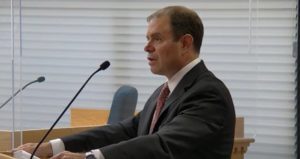
Wrenn pointed out that Troy Bonnell’s phone was near his home, and he was making outgoing phone calls from it at the time Sessions’ body was being dumped in Pingree Park.
“Vague, speculative, imaginary doubt,” Wrenn continued to say throughout his closing argument about the defense’s theory on everything from boot prints, to cell phones, to gun ownership and financial reasons for motive. “Where does the evidence of (Frank’s death) take us? It takes us to his pockets (where they found bullet casings). It takes us to his gas can. It takes us to his burn pit. It takes us to his fabricated stories. … In the end it takes us all to one conclusion. The defendant is guilty for each of the counts he’s charged.”
The jury is considering six counts: two counts of 1st Degree Murder, two counts of tampering with a deceased human body, two counts of tampering with evidence and one count of possession of a weapon by a previous offender. The weapon charge was dropped during the second week of the trial, with prosecutors saying it only complicated the issue. They are also considering a domestic violence enhancer on the charges against Frank.


